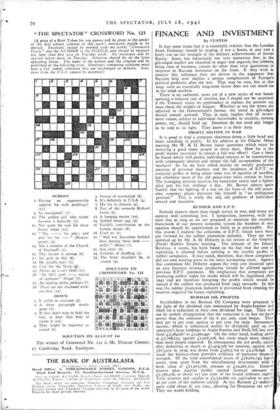FINANCE AND INVESTMENT
By CUSTOS
It may seem ironic but it is essentially realistic that the London Stock Exchange should be staging, if not a boom, at any rate a lively rise on the strength of the military achievements of Soviet Russia. Some but fortunately not very numerous fists in the gilt-edged market are clenched in anger and anguish, but jobbers, being men of business, cannot do other than raise quotations in response to Russian resistance on the front. If they wish to counter this influence they are driven to the argument that Russian help now implies a serious complication of Europe's political problems after the war. That may be true, but at this stage such an essentially long-term factor does not cut much ice in the stock markets.
There is no authentic news yet of a new series of war bonds carrying a reduced rate of interest, but I should not be surprised if the Treasury seizes its opportunity to replace the present tap issue about the middle of August. Whether or not the terms are adjusted in the Government's favour, the trend in gilt-edged should remain upward. That, in turn, implies that all invest- ment values, subject to individual vicissitudes in security, earning power, etc., should hold up. Investors do not need any longer to be told to sit tight. They know it is their duty.
PROFIT MOTIVE IN WAR
It is good to find a company chairman doing a little head and heart searching in public. In his address at the Glacier Metal meeting Mr. W. B. D. Brown raises questions which must be worrying a good many people in these days. How far is the profit motive necessary to ensure a full war effort? Can a basis be found which will permit individual interest to be synonymous with community interest and ensure the full co-operation of the workers? So far we have relied mainly on steeply graduated taxation of personal incomes and the incidence of E.P.T. on company profits to bring about some sort of equality of sacrifice, but otherwise most of the old peace-time rules remain in force. The managing director receives his handsome salary and a fighter pilot gets his few shillings a day. Mr. Brown admits quite frankly that the fighting of a war on the basis of the old peace- time economy places directors like himself in " an ambiguous position." This is really the old, old problem of individual reward and incentive.
RUBBER AND E.P.T.
Nobody expects more than rough justice in war, and many are content with something less. I sympathise, however, with the view that so long as we are prepared to maintain the essential framework of our present economic system the burdens of war taxation should be apportioned as fairly as is practicable. For this reason I endorse the criticisms of E.P.T. which have been put forward by the rubber plantation industry. They are well summed up by Mr. A. H. Doherty in his review at the Gopeng (Perak) Rubber Estates meeting. The attitude of the Inland Revenue, it seems, has been based on the fact that the cost of replanting is allowed before arriving at the taxable profits of rubber companies. It was ruled, therefore, that these companies did not own wasting assets in the strict accounting sense. Against I this contention Mr. Doherty argues the total cost incurred until an area becomes revenue producing should be allowed against previous E.P.T. payments. He emphasises that companies are producing rubber today for stocks which will be liquidated after 7943 and are therefore foregoing the profits which would be earned if the rubber was produced from 7943 onwards. In this e way the rubber plantation industry is prevented from creating the reserves required for future replanting.
BURMAH OIL PROFITS
Stockholders in the Burmah Oil Company were prepared in the light of the dividend cuts announced by Anglo-Iranian and Shell for a reduction in their own dividend for 7940. They will ti not be unduly disappointed that the reduction is in fact no more severe than the omission of the 6 per cent. cash bonus. Thus they get 75 per cent. against 21 per cent. for 7939. Investment vi income, which is influenced mainly by dividends paid on the company's large holdings in Anglo-Iranian and Shell, fell last year from £2,384,997 to D,000,441. On the other hand, trading profit at £2,768,233, against £7,928,328, has risen much more sharply than most people expected. In consequence the net profit, struck after deducting as much as £1,474,728 for taxation, against only £673,057 in 1939, was down from £3,623,779 to £2,276,848. As usual the balance-sheet provides evidence of immense financial strength. Of the total consolidated assets of £28,060,743 liquid assets, even apart from the miscellaneous investments with a Pi book value of £71,975,796, amount to Lio,o67' 172. General reserve plus surplus profits carried forward amounts to £7,586,536, or about 771- per cent. of the issued ordinary capital. Total reserves and surplus at £5,330,866 are equivalent to nearly 4o per cent. of the ordinary capital. At 55s. Burmah ordina units yield about 61 per cent., allowing for Dominion tax relief. They are worth holding.

























 Previous page
Previous page